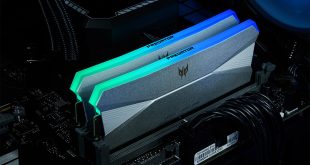You may have missed the breakthrough technology news by Everspin in recent weeks, so we thought we would take a quick look at the hardware.
The company have created Spin Torque MRAM (Magnetic Random Access Memory) which uses an electron ‘spin' to store data in a magnetic, rather than electronic state. This could very well change the architecture of memory.
Mechanical hard drives have been popular for many years now and while they are great low cost option for backing up and storing large amounts of data, the enthusiast audience has long realised that Solid State technology is much better for fast access, quicker boot times and critical situations. In the world of technology the search for performance, and lower power draw is always a priority.
Spin Torque Magneto resistive Memory is high performance, meaning huge levels of bandwidth with copying files, it also is ultra low latency. This is actually the fastest non volatile memory with unlimited endurance. The company claim 1,600 million transfers per second per i/o with a bandwidth of 2.3 GBytes per second. Power usage is also very low and the memory won't lose data if the power fails.
The Everspin proprietary Spin-Torque technology uses a spin polarised current for switching and data is stored in a magnetic state providing a non volatile memory bit that will not suffer wear or data loss and normal retention issues which are generally associated with Flash technology.
In layman's terms this means less power demand, higher performance and crash proof security if power fails.
Kitguru says: We would expect this technology to be making an impact next year, on some level.
 KitGuru KitGuru.net – Tech News | Hardware News | Hardware Reviews | IOS | Mobile | Gaming | Graphics Cards
KitGuru KitGuru.net – Tech News | Hardware News | Hardware Reviews | IOS | Mobile | Gaming | Graphics Cards



